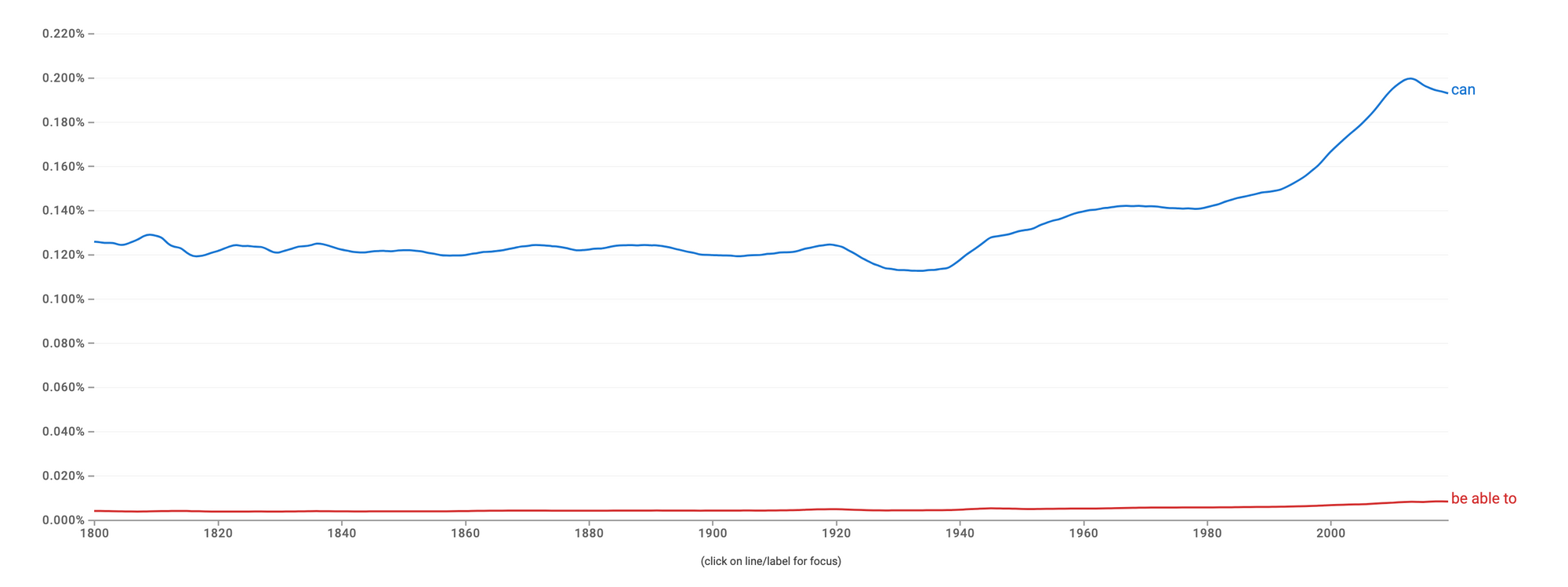What is the difference between "can" and "able to?"
- Use "can" to express general present or future abilities, skills, or talents. It's informal and direct.
- Use "able to" when formality or emphasis is needed. It's slightly more nuanced than "can."
📝 I "can" swim.
📝 She "was able to" swin without the help of her instructor.

When to use can
1. Ability:
- Present or future ability: "I can speak French."
- Requests or offers: "Can you help me?"
- Possibility or impossibility: "It can rain later."
2. Permission:
- Asking politely: "Can I leave early?"
- Giving permission: "You can go now."
3. Suggestions:
- Making suggestions: "We can try again tomorrow."
4. Informal scenarios:
- "Can" is generally informal. Consider "may" or "could" in formal situations.
5. Base verb following:
- "Can" is followed by a base verb, not an infinitive. It's "I can sing," not "I can to sing."
Additionally:
- "Can" has negative ("can't") and past tense ("could") forms.
Examples from the web
"Of course he can." - The New York Times
"Who can blame him?" - The New York Times
Example sentences
- I can swim effortlessly in the ocean.
- Can you pass me the salt, please?
- Despite the challenges, she can overcome any obstacle.
- He can speak multiple languages fluently.
- Can we meet at the coffee shop tomorrow?
- The athlete can run a mile in under five minutes.
- Can I borrow your pen for a moment?
- Even with a busy schedule, they can find time for relaxation.
- Can you believe how fast time is passing?
- With determination, anyone can achieve their goals.
When to use "able to"
Emphasizing Ability
- Highlight specific circumstances: When talking about ability under specific conditions or at certain times, "able to" adds focus.
- Example: I'm not able to run today because of my injury. (Specifics about the obstacle)
- Example: Even with limited resources, he was able to build a beautiful garden. (Emphasis on accomplishment under limitations)
Formal situations:
- "able to" adds a touch of formality, making it preferable in professional settings or written communication.
- Example: We will be able to provide a detailed progress report by next week.
- Example: The applicant should be able to demonstrate strong communication skills.
Past and Future Abilities:
- Talking about ability across tenses: Unlike "can" which primarily lives in the present and future, "able to" comfortably navigates all tenses.
- Example: He was able to swim across the lake as a child. (Past ability)
- Example: I believe you will be able to overcome this challenge. (Future potential)
Other Uses:
- Expressing success or failure: Use "able to" to talk about past actions and whether they succeeded or not.
- Example: She wasn't able to find the lost keys. (Failure)
- Example: Fortunately, we were able to complete the project on time. (Success)
Examples from the web
"They may be able to." - The New Yorker
"Will they be able to?" - The Economist
Example sentences
- She will be able to attend the meeting next week.
- Despite the storm, they were able to finish the construction on time.
- I hope to be able to visit my family during the holidays.
- Will you be able to complete the project by the deadline?
- With hard work, you should be able to achieve your dreams.
- If you study consistently, you'll be able to grasp the concepts easily.
- After some practice, he became able to solve complex math problems.
- Even in challenging situations, we must be able to remain calm.
- With proper training, anyone can be able to play a musical instrument.
- I am confident that we will be able to find a solution to the problem.
In this Ngram graph, we can see that the word "can" has been consistently used through the two centuries, and has been experiencing an increase in occurrence since the 1940s. On the other hand, "able to" has been used to a lesser degree than "can."

"Can" is a standalone modal verb expressing ability, while "able to" is a verb phrase. Use "can" for present ability, direct questions, and negatives. "able to" is used for future, past, and continuous forms, requiring auxiliary verbs and inversion in questions.
FAQ
Can we use "can" and "able to" in the same sentence?
Yes, you can use "can" and "able to" in the same sentence. For example, "I can play the guitar, but I may not be able to perform in front of a large audience." This showcases present ability with "can" and potential future ability with "be able to."
What is the difference between "could" and "be able to?"
"Could" is a past tense modal verb indicating past ability or possibility. "Be able to" is a verb phrase used to express general ability, present, future, or past. "Could" specifically refers to past situations, while "be able to" has a broader temporal scope.
What is the difference between "would you be able to" or "could you be able to?"
Both "Would you be able to" and "Could you be able to" seek permission or inquire about someone's capability. However, "Could" implies a general ability or possibility, while "Would" is more polite and seeks willingness. Both are correct, but "Would" is often considered more polite.
Is it grammatically correct to say "I can be able to?"
No, it is not grammatically correct to say "I can be able to." Both "can" and "be able to" convey the idea of ability, so using them together is redundant. You should choose one expression, such as "I can" or "I am able to."
Summary
In everyday conversation, "can" is often preferred for its simplicity and ease of use. However, in formal writing or when you want to emphasize a particular instance of ability, "able to" might be more appropriate.

Want to sound like a native speaker?
Engram’s AI-powered grammar checker makes your English sound like a native speaker’s, suggesting natural English expressions on top of fixing grammar, spelling, punctuation, word order, and vocabulary.

References:
















